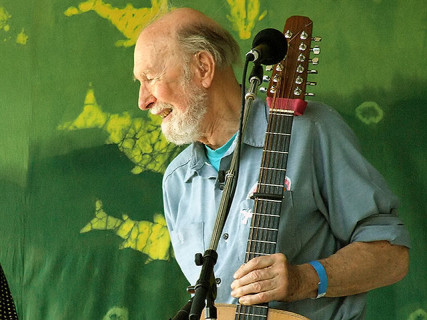
I’m writing this a few weeks after the original discussion of the question took place. I’m also writing this soon after the death of Pete Seeger, who was an atheist the last time I heard him talk live, about 25 years ago. We lived in the same New York City neighborhood for a time back in the mid 1960’s, and both being creatures of habit, would travel from uptown to downtown at the same time, on the same subway car. He’d bring out his banjo and lead the whole car in a hootenanny. Seeger, we’re still waist deep in the big muddy, trying to keep this land our land. Where have all the flowers gone? I know, we shall overcome.
The connection? Seeger was a man of faith. Just listen to his voice, and you will hear his prophetic hope for humankind and the world. We are in a movement, unorganized, but easily defined and observed. Seeger, Old Number Nine still runs by your grave; you can hear it.
There. That is a religion, a movement of people that focuses on human value, which shares a story, or many stories, telling of and shaping our values. A religion may take many forms, and we must be careful when we define the concept that our definition is not special pleading, defining much of humanity out of the picture. You could say religion is by definition the search for God. I could say religion is the search for my prized pig, the patriarch of my breeding stock, on which I base my hopes and faith, to whom I offer daily my slops. I might be insulted by your definition and my exclusion, and you by mine.
For me, the interesting question is not whether atheism is a religion, but can you believe in an otherworldly god and still be religious?
Jan and Eli, thank you for your earlier replies. I read them just before flying to Mexico for a retreat with several Sufi mystics so didn’t then reply. On the flight I read William James’ “Varieties of Religious Experience.” It is a valuable work, a century old, and very relevant now. It describes many different individuals’ and their religious experience without judgment or really, any reliance on dogmatic concepts. He returns to faith and values, our experience, not so much our beliefs, which follow, usually very awkwardly, our experience. I could get involved in intellectual discussions, but hope I can return, with remembrance, to the source, the heart. Permit me to quote from James writing in the second chapter of Varieties:
“[T]he word ‘religion’ cannot stand for any single principle or essence, but is rather a collective name. The theorizing mind tends always to the over-simplification of its materials. This is the root of all that absolutism and one-sided dogmatism by which both philosophy and religion have been infested. … [W]e may very likely find no one essence but many characters which may alternately be equally important to religion. … Were we to limit our view to it, we should have to define religion as an external art, the art of winning favor of the gods. In the more personal branch of religion it is on the contrary the inner dispositions of man himself which form the centre of interest, his conscience, his deserts, his helplessness, his incompleteness. …[T]he acts to which this sort of religion prompts are personal not ritual acts, the individual transacts the business by himself alone, and the ecclesiastical organization, with its priests and sacraments and other go-betweens, sinks to an altogether secondary place. The relation goes direct from heart to heart, from soul to soul, between man and his maker.”
Several writers and responders, in talking of their faith, seem to be asking the foundational question, “Whither faith?” Now that we are beyond the second axial age when we can no longer rationally believe or empirically talk of other worldly things with any any surety that we are beyond that big muddy we call reality, we are finding that our institutions and principalities that support the socialization of religion are either disappearing or changing. Feel the terror, live the excitement. What experience, with our individual backgrounds, sings to our hearts? What experience allows us to dance with another with love?








